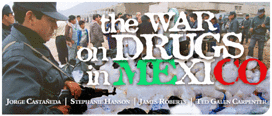Both Jorge Castaneda and Stephanie Hanson make some compelling points. Dr. Castaneda is absolutely correct that Mexico cannot go it alone with regard to significant drug policy reforms. Despite its self-inflicted wounds (most notably the Iraq war and the domestic financial meltdown), the United States is still the 800-pound gorilla in the international system. Mexico and other countries will find it extraordinarily difficult to abandon the prohibition model as long as Washington clings to it — and browbeats foreign governments that show insufficient enthusiasm for that crusade. What the United States has done to its neighbors in the Western Hemisphere in the name of the war on drugs has been both destructive and shameful.
Stephanie Hanson effectively underscores the limited success of Plan Colombia, which was both a counter-insurgency measure and a counter-narcotics measure. It has achieved modest success with respect to the first goal, but it has failed rather spectacularly with respect to the second. Both U.S. and UN statistics confirm that the flow of drugs from Colombia remains robust. In her initial essay, Ms. Hanson also provides a concise illustration of the “push-down, pop-up” effect of supply-side campaigns in the war on drugs. The “successes” in the Andean region and the Caribbean merely shifted drug cultivation and transportation to other locations. It is a real-world example of the cliché about re-arranging the deck chairs on the Titanic.
Her call to take measures to reduce the flow of weapons from the United States into Mexico, however, is misplaced. As Dr. Castaneda rightly points out, the Mexican government’s statistics are of dubious reliability. He is correct that many of those weapons probably come from the former Soviet Union and other sources in a very active international black market. Indeed, many of those weapons appear to come from the Mexican military itself. The bottom line is that we could close every gun shop and shut down every gun show in the United States without having a meaningful impact on the ability of the cartels to arm their enforcers.
James Roberts frequently wanders off topic to condemn virtually every social change (from legalized abortion to an intensified pursuit of personal “pleasure”) that has taken place in the United States and the world in the past 50 years. Even when his observations are correct, they tell us little about how to adopt effective policies. Psychotropic drugs tend to be bad for people. Stipulated. But a great many things are bad for the human body and raise health care costs — including tobacco and high-fat foods. Left-wing moral crusaders use the same arguments that Mr. Roberts does to wage their increasingly intrusive legal crusades against those “evils.” My Mormon friends insist that caffeine is an insidiously unhealthy substance. Are we to justify a war against coffee, tea, and sodas on that basis? We already tried to stamp out the use of alcohol — with ugly policy consequences. Our current war on drugs is equally misguided.
As a scholar at a conservative think tank, Mr. Roberts should understand how markets work, and how ham-handed efforts to interfere in those markets are always futile and often disastrous. Conservatives also rightly scorn liberals who cling to failed policies decade after decade. Yet that is precisely what he does with respect to drug prohibition. We have waged Richard Nixon’s “war” on drugs for nearly four decades. That is substantially longer than the Thirty Years’ War that devastated much of Europe in the seventeenth century. The principal results of our modern Forty Years’ War have been to fill our prisons, primarily with small-time drug pushers, and to create horrific problems of violence and corruption, both in the United States and abroad. When a policy has failed over a period of four decades, it is time to try something else. No advocate of legalization has ever contended that it is a panacea or a “silver bullet.” But it would be substantially better than the indisputable folly of prohibition. We’ve already exceeded the length of the Thirty Years’ War. Let’s not try to replicate the Hundred Years’ War.

